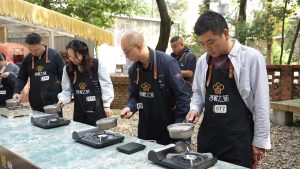Shanxi Restaurant Offers Lion Cub Hugs with Afternoon Tea SAMPLE
Shanxi Restaurant Offers Lion Cub Hugs with Afternoon Tea
SAMPLE
抱小狮子喝下午茶
抱小狮子喝下午茶

AA
AA
AA
AA
Simplified
Traditional



Pinyin



Pinyin
Keywords
抱 - bào - to hold / to carry (in one's arms) / to hug / to embrace
狮子 - shīzi - lion
喝 - hē - to drink
下午 - xiàwǔ - afternoon
茶 - chá - tea
饭店 - fàndiàn - restaurant / hotel
贵 - guì - expensive
元 - Yuán - Chinese Yuan (CNY)
喜欢 - xǐhuan - to like / to be fond of
有钱人 - yǒuqiánrén - the rich / the wealthy
玩 - wán - to play / to have fun
这样 - zhèyàng - this kind of / so / this way / like this / such
做 - zuò - to do / to make / to produce / to write / to compose / to act as / to be
真 - zhēn - really / truly / indeed / real / true / genuine
Grammar
在 + Place - Expressing to be located in or at a certain place with "zài + Place"
在中国山西,有一个饭店的下午茶很贵,要1000多元。
Place + 有 + Object - Expressing the existence of an object in a certain place with "Place + yǒu + Object" (similar to "there is" or "there are")
在中国山西,有一个饭店的下午茶很贵,要1000多元。
这个饭店里有小狮子。
Measure Word - Expressing the number of sth with an object specific measure word in the form of "Number + Measure Word + Noun" (if the number is one, you can omit it and use the measure word by itself)
在中国山西,有一个饭店的下午茶很贵,要1000多元。
Proper Noun / Noun / Pronoun + 的 + Noun - Expressing a possessive particle, relationship or link with "Proper Noun / Noun / Pronoun + de + Noun"
在中国山西,有一个饭店的下午茶很贵,要1000多元。
Noun / Pronoun + 很 + Adj. - Expressing "very" or to link a noun or pronoun and an adjective with "Noun / Pronoun + hěn + Adj." (sometimes the 很 is translated as "very" but often it is a link between a noun and an adjective)
在中国山西,有一个饭店的下午茶很贵,要1000多元。
Subject + 要 + Noun - Expressing "to want something" with "Subject + yào + Noun" (negative formed with 不要)
在中国山西,有一个饭店的下午茶很贵,要1000多元。
Number + 多 - Expressing a number in excess with "Number + duō"
在中国山西,有一个饭店的下午茶很贵,要1000多元。
这 / 那 + Measure Word + Noun - Expressing "this… / that…" with "zhè / nà + Measure Word + Noun"
这个饭店里有小狮子。
(在)...里 - Expressing "in / inside…" with "(zài)...lǐ"
这个饭店里有小狮子。
也有人说:“在饭店里和狮子玩,这样做真的好吗?”
Noun + 们 - Expressing the plural form of a noun with "Noun + men"
人们在喝下午茶的时候,能抱着小狮子。
...的时候 /...时 - Expressing "when…" with "...de shíhou / ...shí"
人们在喝下午茶的时候,能抱着小狮子。
Subject + 能 + Verb + Object - Expressing that the subject "can" do a particular action with "Subject + néng + Verb + Object" (means "to be able to" and expresses having a certain ability or having obtained a certain minimum requirement)
人们在喝下午茶的时候,能抱着小狮子。
Verb + 着 - Expressed after verbs to indicate an action in process with "Verb + zhe"
人们在喝下午茶的时候,能抱着小狮子。
Subject + 都 + Verb / Verb Phrase - Expressing "all / every" to emphasise the quantity with "Subject + dōu + Verb / Verb Phrase" (都 emphasises the quantity or frequent occurrence)
很多人都不喜欢。
是 + Emphasised Detail + 的 - Expressed to draw attention to and emphasise a particular detail with "shì + emphasised detail + de" (frequently used when asking details about the past or telling details about the past)
有人说:“这是给有钱人玩的。”
给 + Recipient + Verb - Expressing a more informal "for sb / sth..." with "gěi + Recipient + Verb"
有人说:“这是给有钱人玩的。”
Statement 1,也 + Statement 2 - Expressing "also" to link two statements with "Statement 1,也 + Statement 2"
有人说:“这是给有钱人玩的。”也有人说:“在饭店里和狮子玩,这样做真的好吗?”
Noun 1 + 和 + Noun 2 - Expressing "and / together with / with" with "Noun 1 + hé + Noun 2"
也有人说:“在饭店里和狮子玩,这样做真的好吗?”
Statement + 吗? - Expressed at the end of a statement to create a yes-no question with "Statement + ma?"
也有人说:“在饭店里和狮子玩,这样做真的好吗?”
Proper Nouns
山西 - Shānxī - Shanxi (Province)Idioms
Ready to complete the lesson's exercises?

Complete Assignment Reading
Shanxi Restaurant Offers Lion Cub Hugs with Afternoon Tea


Level 1
Live dictionary
 Stroke
Stroke Write
Write


























